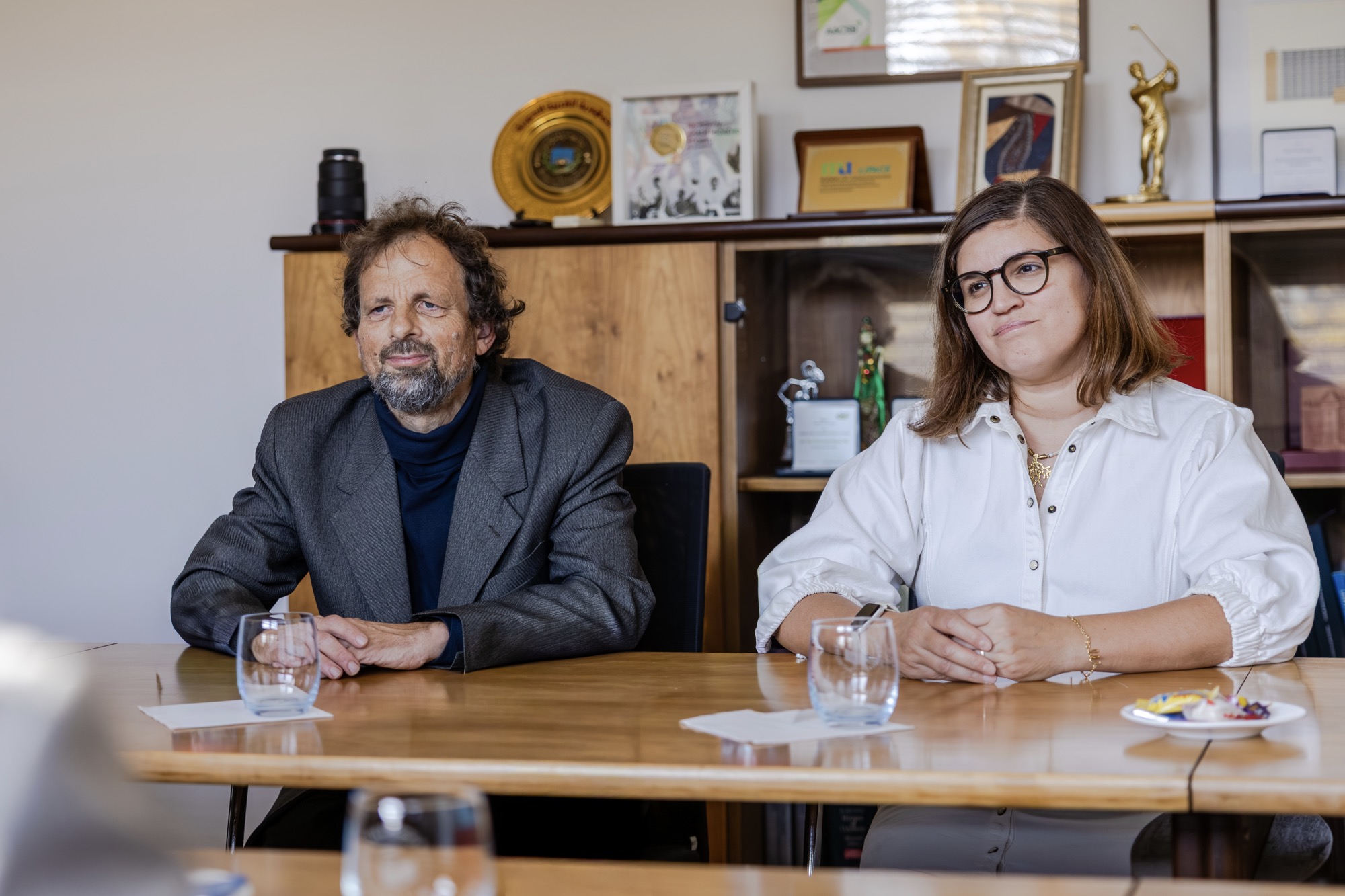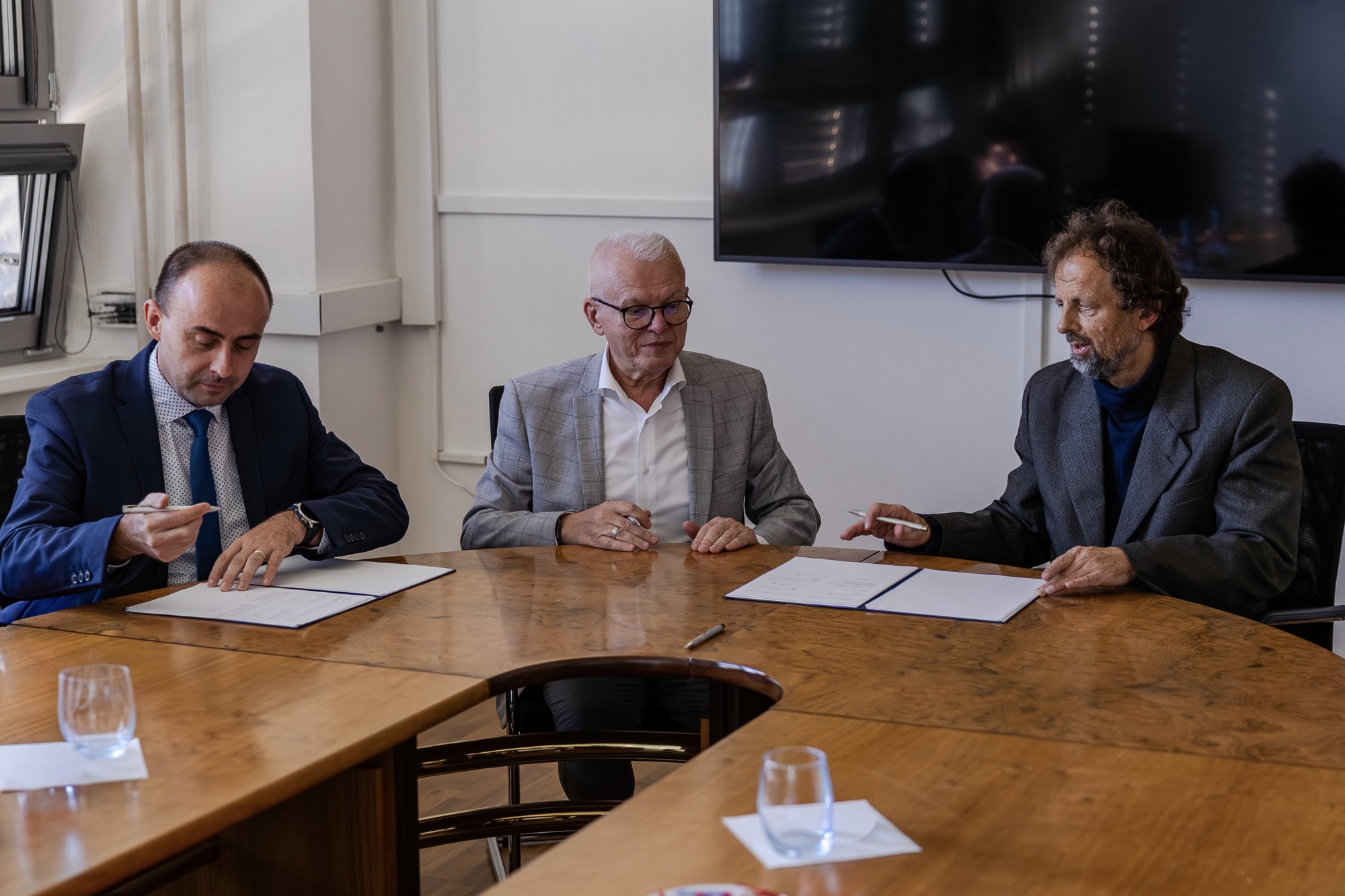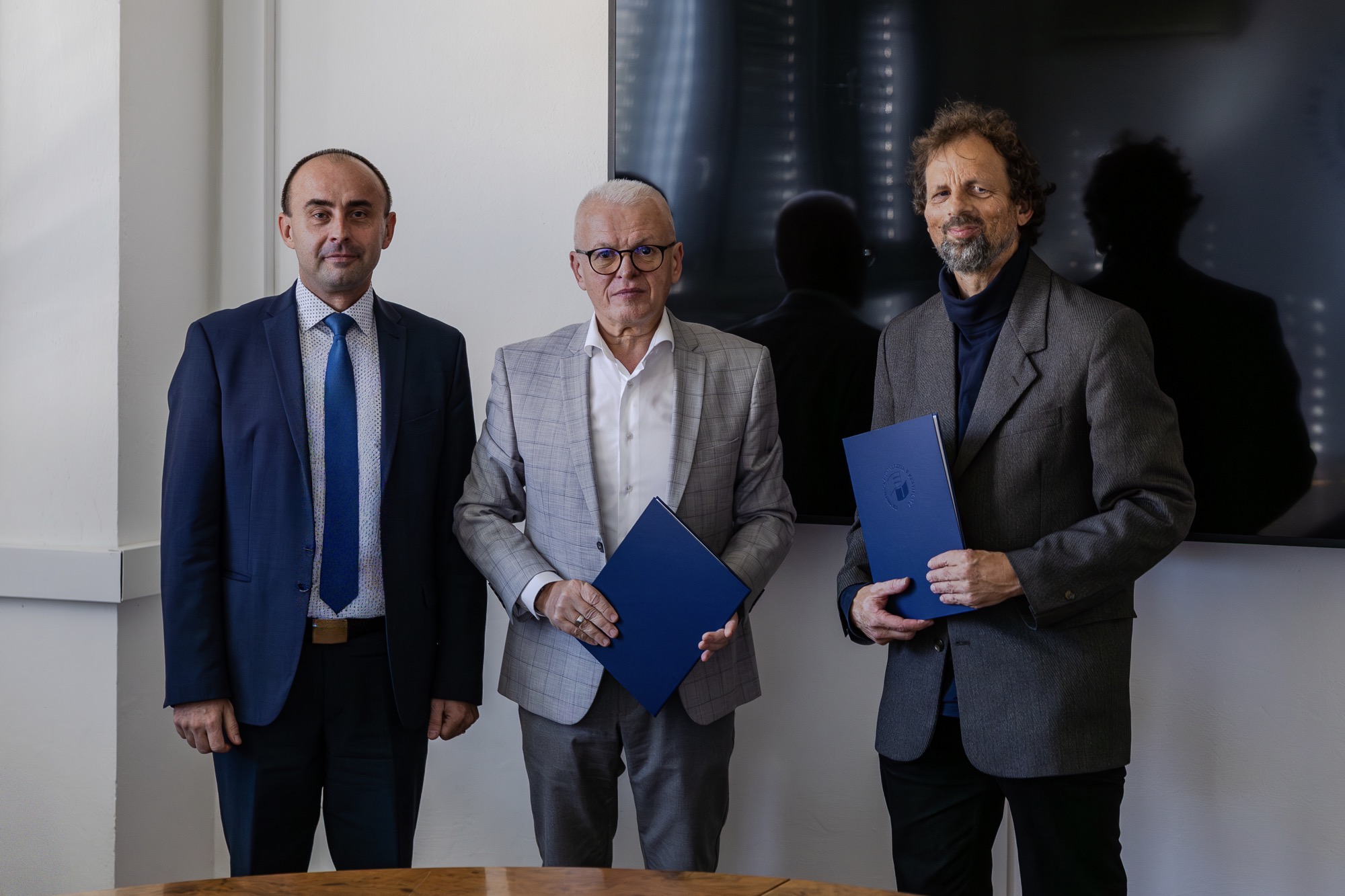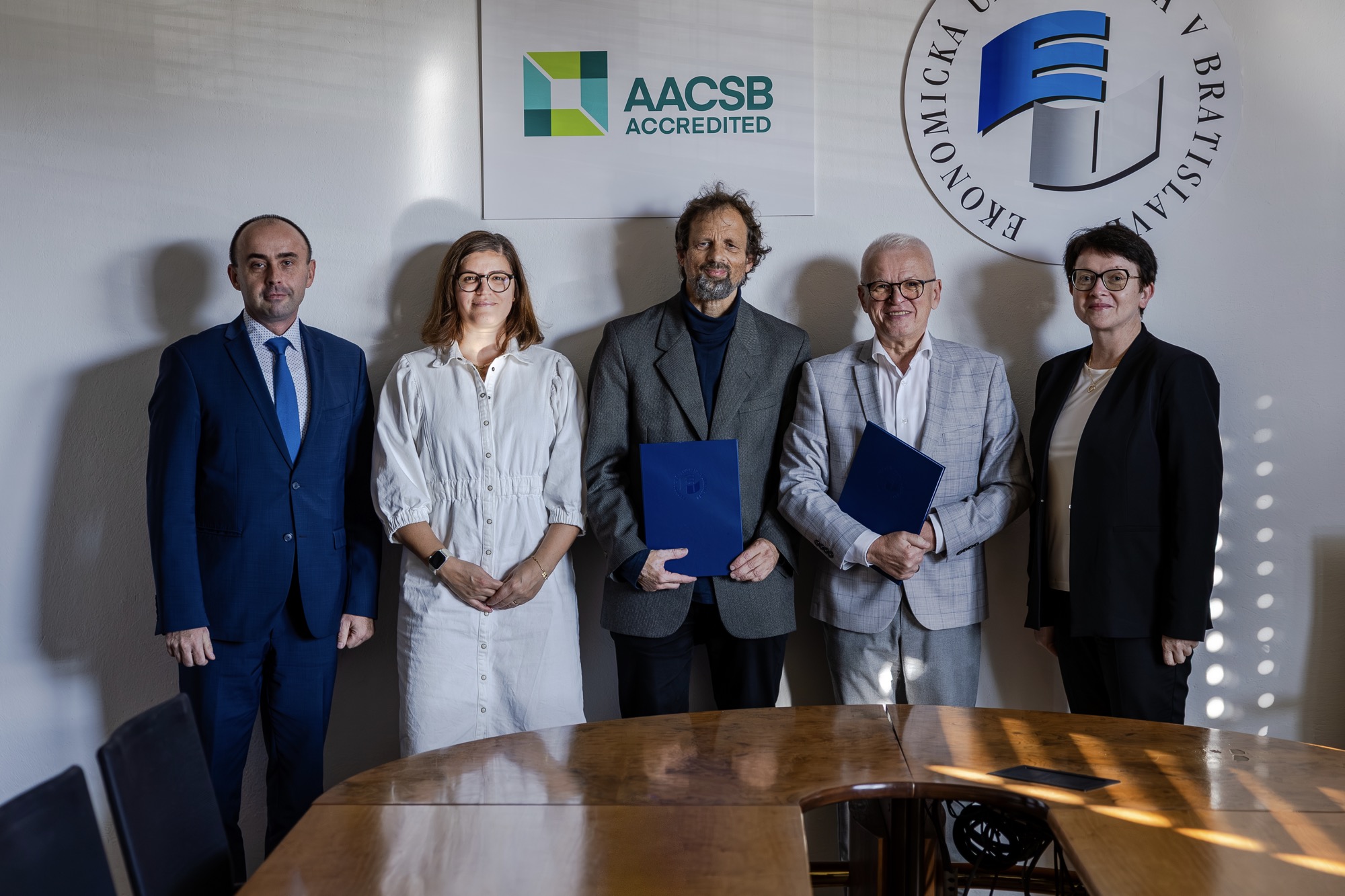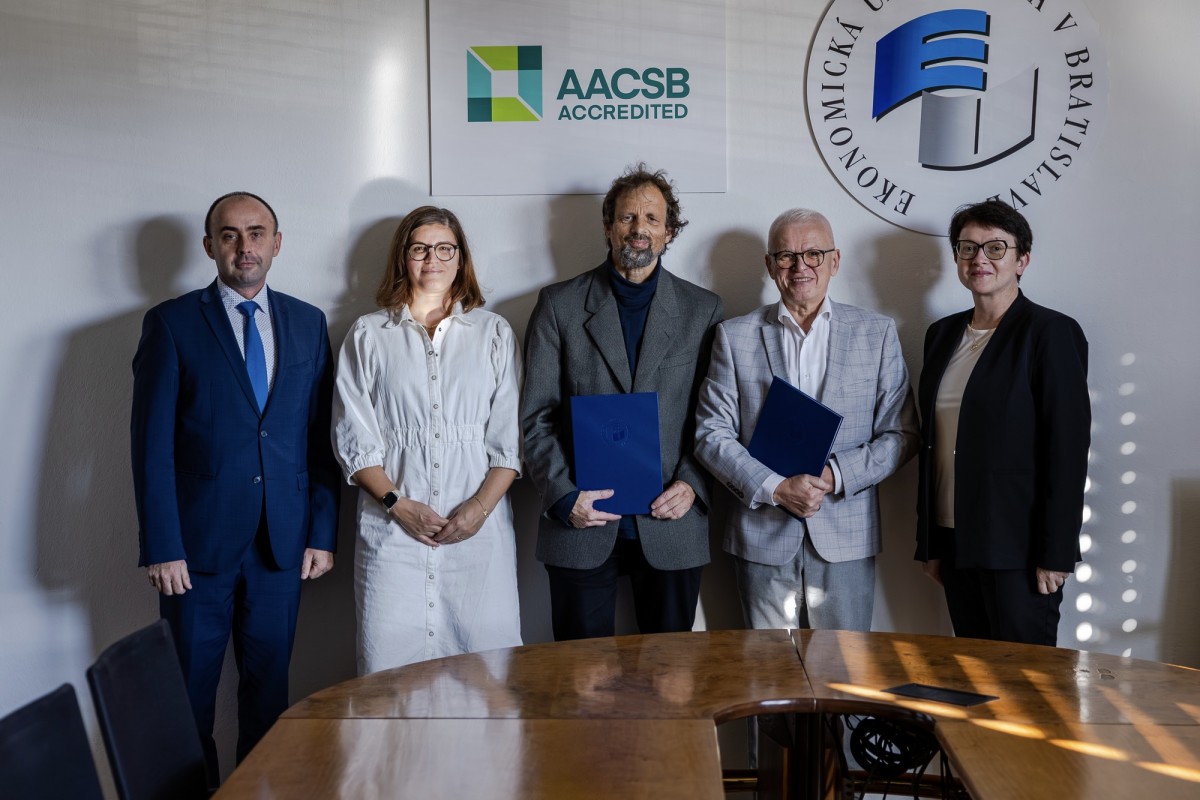The Rector of the Bratislava University of Economics and Business (EUBA), Prof. Ferdinand Daňo, recently received a delegation from the Faculty of Applied Languages and Intercultural Communication of the University of Applied Sciences Zwickau (WHZ). He welcomed the Dean of the Faculty, Prof. Thomas Jonen, and Prof. Janina M. Vernal Schmidt to the EUBA. The meeting culminated in the signing of a double diploma agreement, which is the result of many years of cooperation between the two universities. It also builds on joint activities in the field of language education, research, and international student mobility.
About the WHZ partner university
The University of Applied Sciences Zwickau is a modern German public university with a strong focus on applied research, technology, economics and intercultural communication. It has a long tradition of connecting practice with higher education and works closely with regional and international partners. The Faculty of Applied Languages and Intercultural Communication is one of the recognized workplaces in the fields of language and cultural studies, business communication and international management. The partnership with EUBA is a natural continuation of the shared vision of modern multicultural education.
The double degree agreement brings significant opportunities not only for students, but also for the faculty itself. We spoke with Dr. habil. PhDr. Ildikó Némethová, PhD., Vice-Dean for International Relations at the Faculty of Applied Languages at EUBA, about how the new double degree was created, who it is intended for, and what its ambitions are for the future.
Madam Vice-Dean, can you briefly summarize what were the main motivations for concluding a double degree agreement between the Faculty of Applied Languages of the EUBA and the Faculty of Applied Languages and Intercultural Communication of the University of Applied Sciences Zwickau?
The main motivation for concluding the agreement was to create a joint bachelor's program that will provide students with the opportunity to obtain two full university degrees: one from the Faculty of Applied Languages EUBA and the other from the Faculty of Applied Languages and Intercultural Communication at the University of Applied Sciences Zwickau. The agreement was concluded with the aim of deepening international cooperation, supporting multicultural education and the development of intercultural communication and language skills.
What exactly does "double degree" mean in this context - what degrees will students earn, what is the recognition mechanism?
A double diploma means that after successfully completing the set obligations at both partner universities, the student will receive two separate bachelor's degrees: the "Bachelor (Bc.)" degree at EUBA and the "Bachelor of Arts (B.A.)" degree at Westsächsische Hochschule Zwickau. The recognition mechanism is based on the mutual recognition of subjects and credits according to the study and examination regulations of both parties, on mandatory mobility in defined semesters and on joint supervision and defense of the bachelor's thesis, which takes place before an international committee.
For which study programs will this option be open?
The opportunity to obtain a double diploma is intended for students of the bachelor's program "Foreign Languages and Intercultural Communication" at EUBA in the language combination English - German and for students of the bachelor's program "German Business Communication" at Westsächsische Hochschule Zwickau.
What are the main requirements for students who want to participate in this program (length of study, language skills, mobility, exchange period)?
Students of the Faculty of Applied Languages must successfully complete the first two semesters of study and demonstrate a language level of at least B2 in English and German. Students from WHZ must have a language level of at least B1 in both languages and also complete the first two semesters of study. Mobility is strictly defined: EUBA students complete the 3rd and 4th semesters at WHZ, while WHZ students spend this period at EUBA. During mobility, they remain enrolled at their home university and are simultaneously enrolled as students at the partner institution.
How will the student experience change – what are the benefits of participating in such a program over traditional study?
The student will gain a significantly richer academic and personal experience. He/she will obtain two recognized diplomas, a longer-term study experience abroad and improve his/her language skills in both academic and professional contexts. The program develops intercultural sensitivity, the ability to function in an international team and provides a broader overview of different academic systems. Students also benefit from intensive contact with teachers from two universities, an international defense of the bachelor's thesis and better employability in the labor market.
How do you evaluate the contribution to the faculty – from what perspective (internationality, partnerships, reputation)?
The agreement brings the faculty a strengthening of its international profile, a deepening of the partnership with a high-quality German university and the possibility of harmonizing and comparing the level of teaching and the quality of study programs. It supports student mobility, creates space for joint projects and increases the reputation of the faculty in the European academic environment. The cooperation also makes the faculty visible as a modern institution with a clear emphasis on internationalization and linking intercultural education with practice.
What are the expectations for the future – whether it be expansion of partnerships, new countries, programs, or deeper cooperation?
It is expected that the cooperation between the two institutions will gradually deepen, especially in the areas of teaching, joint projects and research. The program may serve as a model for expansion to other language combinations or for follow-up master's studies in the future. The agreement creates a framework that is flexible enough to develop new forms of academic cooperation.
What advice would you give to students who are hesitant about joining the program?
Students can be advised to view this program as an extremely valuable investment in their future. Obtaining two diplomas, a long-term study experience abroad, and intensive development of language and intercultural competences represent an equipment that will be appreciated by employers in the European and global markets. In addition, the program supports personal growth, adaptability, and building an international network of contacts, which are advantages that traditional studies cannot offer to the same extent.
EUBA further expands its double degree network
The Bratislava University of Economics and Business has been developing international cooperation through double and joint degree programs for a long time. It currently offers several options at various faculties – in cooperation with universities in France, Germany, Great Britain, Ireland, South Korea, Portugal, Italy, Latvia, Luxembourg, the Czech Republic, Bulgaria, and Ukraine.
The signing of the agreement with Westsächsische Hochschule Zwickau represents another step in the systematic building of a portfolio of study programs that allow EUBA students to obtain an education with European added value. This is an important partnership that complements the already existing double degree cooperation and at the same time opens up space for further initiatives.
EUBA thus confirms its position as a modern, internationally oriented university that provides its students with high-quality and competitive education in the European area.
